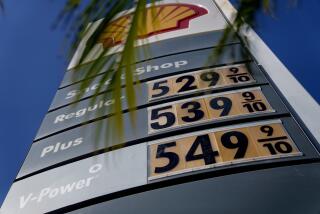Energy Department predicts higher gas prices
Gas prices began rising around Labor Day and motorists have seen little relief since. Now, the Energy Department has boosted its pump-price predictions for the peak driving season, defined as April through September, and for the full year.
Peak prices will average $3.925 for a gallon of regular gasoline in the peak driving season, 5.7% higher than during last year’s peak season and up from February’s forecast of $3.62 during the peak months, according to the agency’s monthly Short-term Energy Outlook. The high is projected to be $3.96 in May.
If national prices average just south of $4 a gallon during the peak season, then there will be times when the U.S. average probably will exceed $4. And California drivers can expect to pay a lot more because of the state’s cleaner-burning type of gasoline.
As to the question of whether U.S. prices will reach $5 a gallon, as some analysts have predicted, the Energy Department says maybe: Based on current prices of gasoline futures contracts, there’s a 2% chance that the average U.S. gasoline price will hit $5 a gallon for all of June. The agency put the probability of getting $4 gas in June at 39%.
For all of 2012, regular gas will average $3.79 a gallon, the Energy Department said. That’s the most expensive since 1976, without adjusting for inflation. In February, government forecasters were expecting the annual average to be $3.55 a gallon, up from $3.53 in 2011.
All of this pain at the pump will trim gasoline demand, the Energy Department said, predicting consumption averaging 8.66 million barrels a day this year (February’s forecast for 2012 was 8.71 million barrels a day), down about 1% from 2011 consumption. Other reasons for the consumption decline include slowing growth of the driving age population and improving vehicle fuel economy.
ALSO:
Americans are buying more fuel-efficient cars
More to Read
Inside the business of entertainment
The Wide Shot brings you news, analysis and insights on everything from streaming wars to production — and what it all means for the future.
You may occasionally receive promotional content from the Los Angeles Times.










